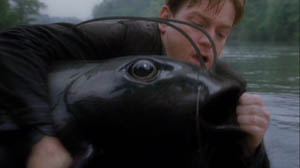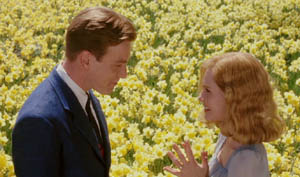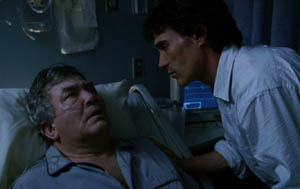|
Tim Burton is a director whose oeuvre has swung widely in terms of quality, and far less widely in terms of style. Drenched with the darkness of Gothic imagery and the conflicting whimsy of circuses and freak shows, he's veered from wacky comedy (Beetlejuice) to adventure (Batman) to bio-pic drama (Ed Wood) without really changing a hair in terms of overall approach. It's hard to deny his talent for scenery, but those of us who preferred the character-driven sincerity of Ed Wood over the cartoonish excess of Mars Attacks would probably be happier if he more often used his powers for good instead of evil, and by "evil" I mean "overly self-indulgent wackiness for its own sake that manages to not end up being all that funny." Big Fish is a relief for us, then, as Burton steps further than usual out of his standard comfort zone. 
Anyone who has seen the film or any of its marketing is probably looking at that previous sentence as if it was a product of derangement on the part of the reviewer. This film does veritably scream Tim Burton. There are circus freaks. There are weird creatures, like hopping spiders and a fish the size of a hog. Helena Bonham Carter plays a witch whose glass eye can fortell the time and manner of your death. It's a Tim Burton movie, no mistake. It's not the trappings that matter, but rather what you do with them. Here, he aims for a story with actual emotional resonance, and the results are wonderful. Edward Bloom has led a long and colorful life of adventure, a fact known to all within earshot. What's less known is just how much of his fabled accounts is truthful and how much is a product of wild imaginings. His son Will feels that his father, now on his deathbed, has kept him at arm's length for a lifetime by virtue of his tall tales, never letting the "real" Edward out of the bag. He wants, before the opportunity is lost, to finally know his father. Edward insists he's only ever told the truth about himself. From what we see of his stories, presented as gloriously styled flashbacks that always cleave a hair to the fantastical side, we aren't quite sure if we should believe Edward, but it's entirely possible he means something else with that answer. His nature is to tell, as they say, fish stories. To do so is therefore truthful to himself. For Will, the issue is twofold: issues of truth aside, he's simply sick of his father's tales, feeling that they paint the old man as a joke. Yet there's an undercurrent of jealously present: his father has upstaged him for much of his life. It's irritating, yet enviable for any aspiring writer, a vocation Will has followed, with successful if bland results. By contrast, his father is, as he admits, a very likeable man. 
The heart of Big Fish is the role fiction plays in our lives. Our own accounts of past exploits tend, in the telling and re-telling, to polish the edges, to emphasize the exciting aspects and omit the boring details, however significant they may have genuinely been. Will feels his father's extraordinary life was born of dissatisfaction with the realities of work and family, a means of coping with a life less rewarding than that which he'd desired as a child. Perhaps there's an element of truth in that, but in a way we all use fiction to cope with harsh realities; why else would we read or watch movies? Our stories allow us a measure of control, which life denies us with its stubborn refusal to play out like a well-plotted three-act narrative. There's at least a kernel of truth in all of Edward's stories, and not all of them happy kernels. The fearsome witch haunting the tales of his childhood has an unexpectedly poignant reality lurking behind her classical folk-tale iconography. 
There are those who would maintain (and those that have) that the ending refuses to deal head-on with the harsh realities of life and death. I would submit that in its own way, this is entirely the point: that we willfully bend the truth to make life more bearable. Yet Big Fish never deceives us about the truth of Edward's ultimate fate; it merely offers an alternate telling we know to be impossible but which is altogether more satisfying, giving us an ending that is sad yet oddly triumphant. I suspect that Tim Burton, like most artists, is trying for what he happily gives his protagonist: a fascination that will ultimately outlive him. In the best interest of that goal, I would suggest that he make more films of this calibur, ones true to himself yet eminently relatable for the rest of us. -review by Matt Murray
|
|
||||||||